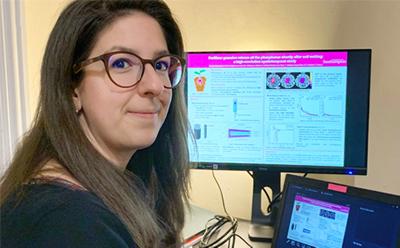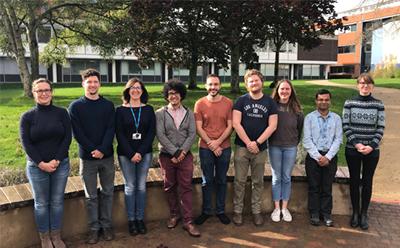Award-winning bioengineering research to optimise how we fertilise our fields

Postdoctoral researcher Chiara Petroselli from the University of Southampton has been honoured by the International Fertilizer Society for a ground-breaking study of phosphorus that could help increase crop yield while minimising side effects.
Chiara is the overall winner of the 2020 Brian Chambers International Award for Early Career Researchers in Crop Nutrition for her high-resolution investigation of phosphorus release from fertiliser granules.
Southampton’s Daniel McKay Fletcher was one of three runners-up in the competition for a maize model that calculates the best time to apply nitrogen fertiliser for any given growing season.
Chiara’s award-winning research revealed how phosphorus is released into soil over space and time using minimally invasive sampling and imaging techniques. The findings were recently published in the Soil Science Society of America Journal.
“This is the first time this release dynamics have been observed, and could potentially change the way we fertilise our fields,” Chiara explains. “The main finding is that all the phosphorus is released from the fertiliser granule shortly after soil wetting, producing a pulse of high P concentration which is then immobilised over time.
“I'd like to keep working on research in academia, and this prize is a milestone on this path. I’d like to thank Professor Tiina Roose and the whole research team here in Southampton. The group’s interdisciplinary approach to scientific problems is achieving excellent results.”
(Image caption: The Southampton Rooty Group. From left: Professor Tiina Roose, Daniel McKay Fletcher and Chiara Petroselli.)

Daniel McKay Fletcher’s research used numerical modelling to explore how nitrogen fertiliser loss within fields is regulated by rainfall.
On average, the study found that weather-optimised fertilisation strategies could improve crop nitrogen uptake by around 20 percent. In drier years, the modelling improved the efficiency of crop nitrogen recovery by 35 percent.
“Typically, the growth stage of the crop dictates when farmers apply nitrogen fertiliser while less attention is paid to the rainfall pattern,” Daniel says. “Our results confirm that growth-stage-timing of fertiliser is important for fertiliser efficiency, but improvements can be made by considering the precipitation patterns carefully. These findings can help inform optimal fertilisation strategies in future climates.”
Daniel thanks joint first author Siul Ruiz, PhD supervisor Professor Tiina Roose, and Professors Davey Jones and Dave Chadwick from Bangor University for their support throughout the project. The research has been published in Science of the Total Environment.
Professor Roose, of the Bioengineering Science Research Group, says: “I was incredibly proud of our researchers when I heard that Chiara, Daniel and Siul Ruiz were three of the 10 finalists in this highly competitive Early Career Award. The 10 finalists were from seven different countries, demonstrating the breath and the importance of this research area worldwide.
“I am so pleased for Chiara for winning the top prize and Daniel being one of the three runners up. This international recognition confirms that they are great ambassadors for their field and amazing up-and-coming interdisciplinary research leaders.”